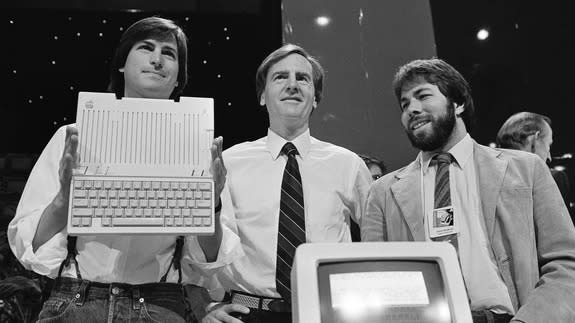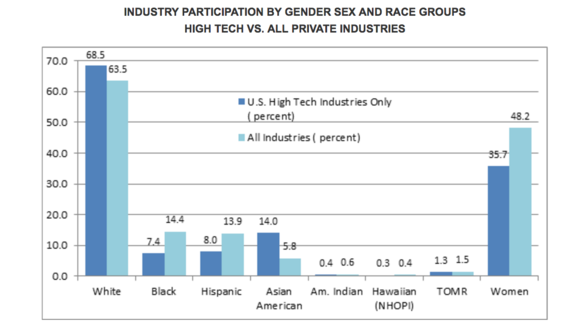Tech is dominated by even more white dudes than the rest of the private sector

White dudes are disproportionately represented all across the United States work force, and there is even less diversity among jobs that the Equal Employment Opportunity Commission labels "high tech."
In a report released by the EEOC following a Wednesday hearing on tech sector diversity, the commission outlined 2014 stats that show people employed in "high tech sector" jobs are whiter and more male than the average private industry job.
SEE ALSO: Top women in tech join forces to push startups to tackle diversity earlier
In the tech sector, which the report defines as "industries that employ a high concentration of employees in science, technology, engineering and mathematics," 68.5% of employees are white, compared with 63.5% across the private sector.

Image: PA Wire/Press Association Images
In 2014, the same year on which the report's data is based, white people made up 62.1% of the country.
Asian Americans also made up a disproportionately high number of tech sector employees. Around 14% of those jobs were held by Asian Americans in 2014, compared with 5.8% across private industry.
African Americans, who made up 13.2% of the country that year, held just 7.4% of tech sector jobs. Hispanics, despite making up 17.4% of the population in 2014, held just 8% of tech sector jobs.

Image: EEOC
Women also held only 36% of tech jobs in 2014, compared with 48% across the private sector, a 25% discrepancy.

Image: Spaulding/McMullan/Sipa Press
And the numbers get less diverse up the chain of command.
White people made up 83.3% of tech executives, according to the study, and 80% of all tech executives were men.
This is not a new problem for Silicon Valley and the like.
Twitter, one of the darlings of the tech industry, was blasted for ending 2015 by hiring a white man to head their diversity efforts just weeks after firing Leslie Miley, the only black engineer with a leadership role.
When tech giants Intel, Microsoft and others released their diversity numbers last year, they both showed that around 75% of their employees were men. At Microsoft, 88% of upper-level employees were male.
In a press release following Wednesday's hearing, the EEOC said that the level of diversity in tech jobs "has in many ways gotten worse" as the industry has grown.
Testimony from Wednesday's hearing pointed to problems with access to computer science education in minority communities that could lead to jobs in the tech sector.
And women in the U.S. now earn a smaller percentage of the total number of computer science degrees than they did in 1984, down from 37% to 18%, according to the testimony of Kweilin Ellingrud, a principal at McKinsey, a management firm. Many women also view the tech sector as an area in which it is difficult for women to succeed.
In order to fill an increasing number of tech-related jobs, several who testified before the commission believe efforts to hire women and non-white men must increase.
Right now, the talent pool in the U.S. is simply too small to fill what they see as a growing need, and that in some ways is because the talent pool is largely filled with white men.
